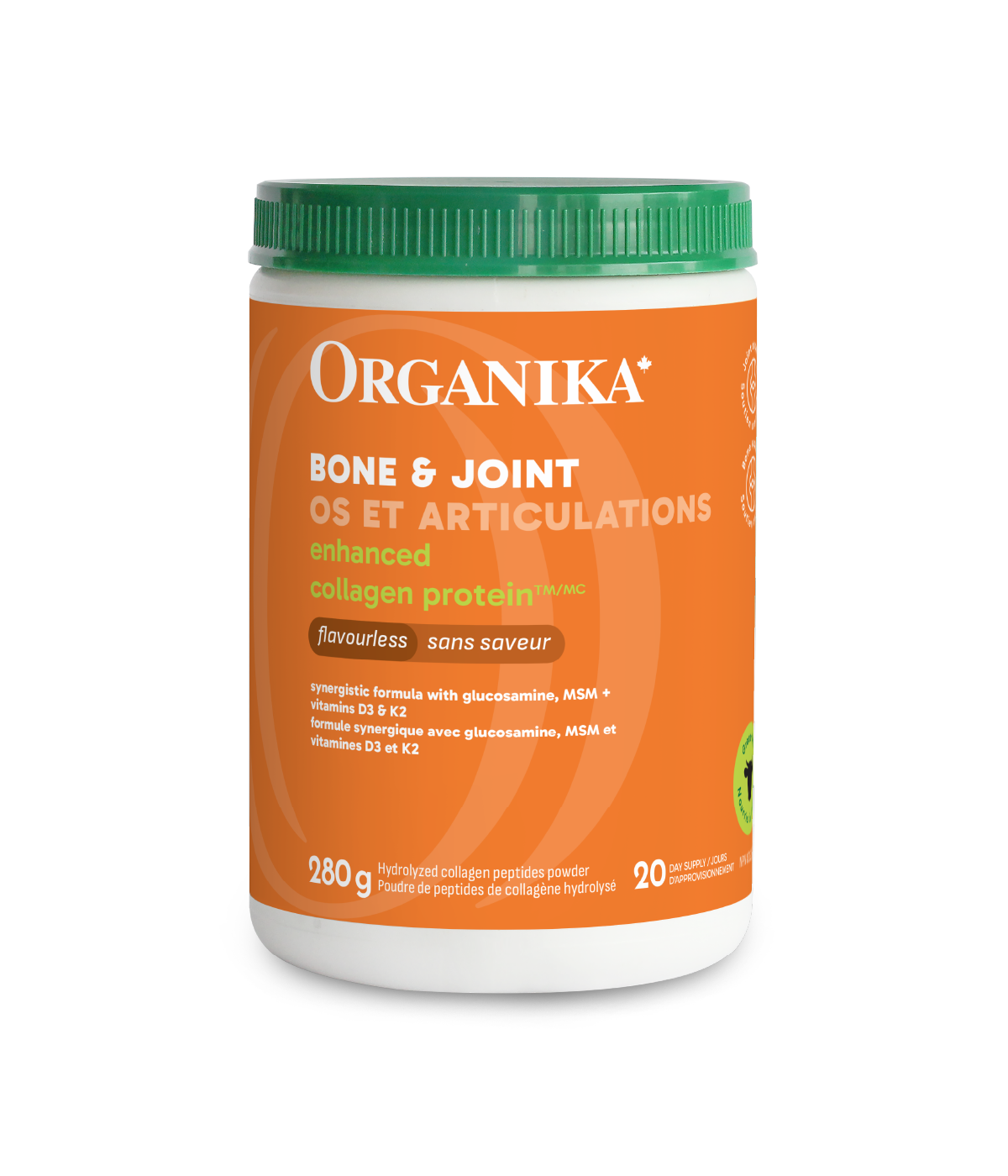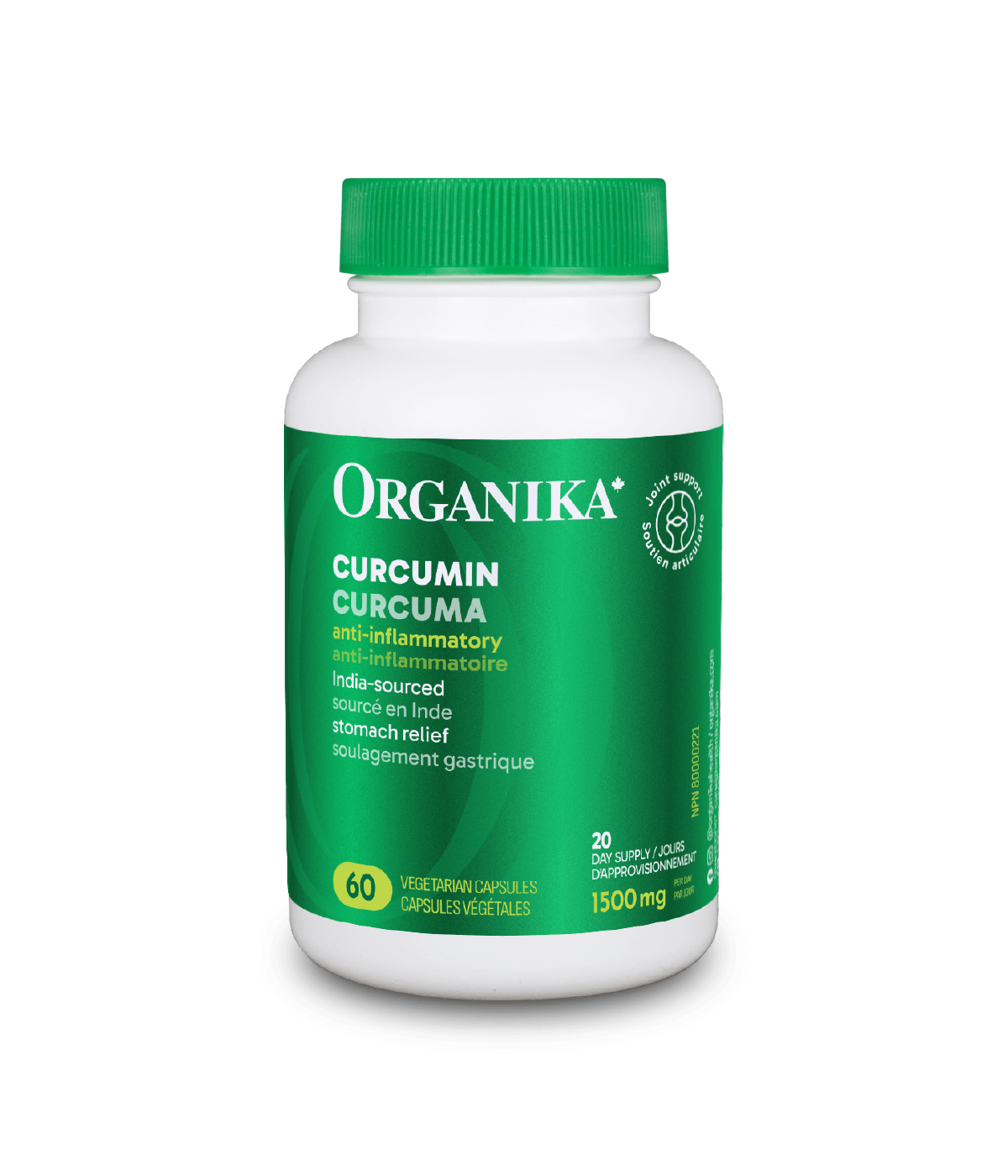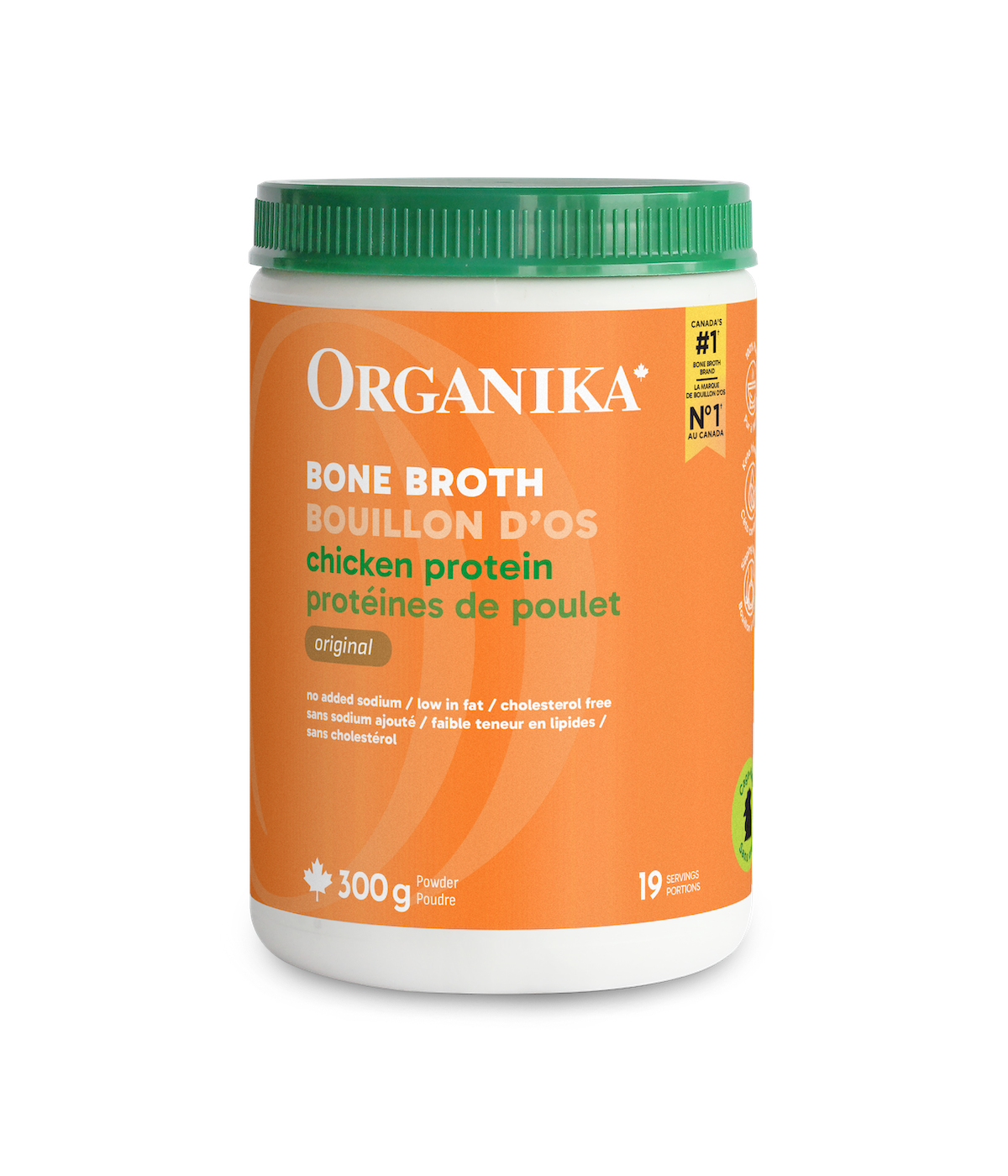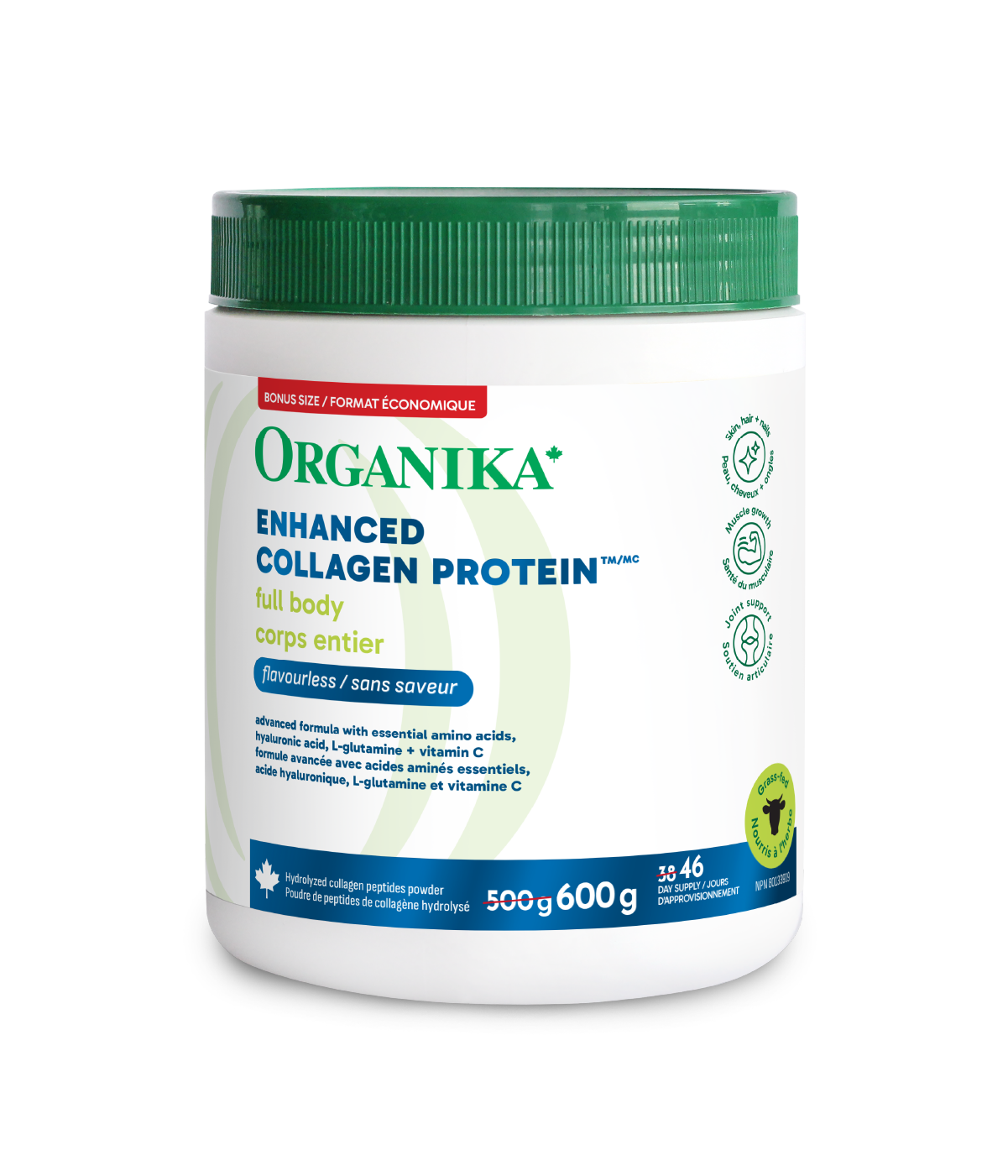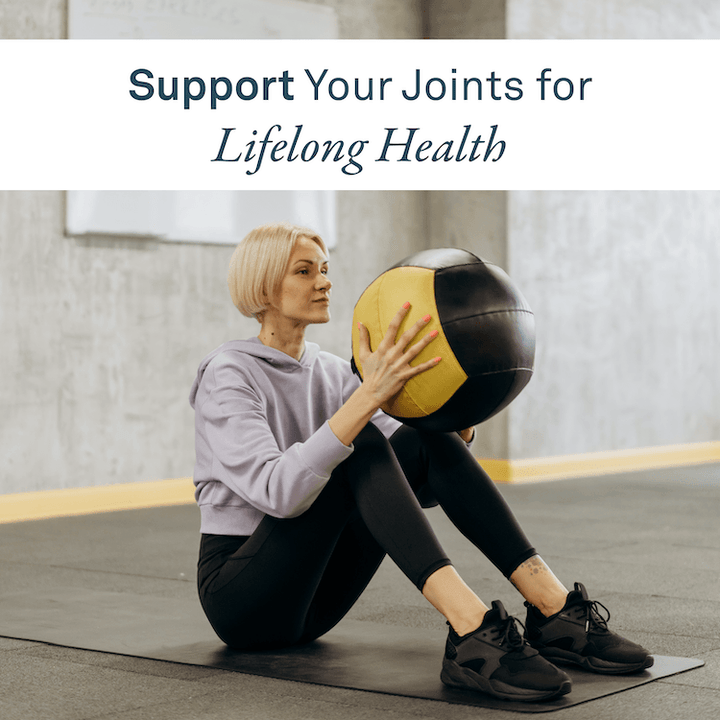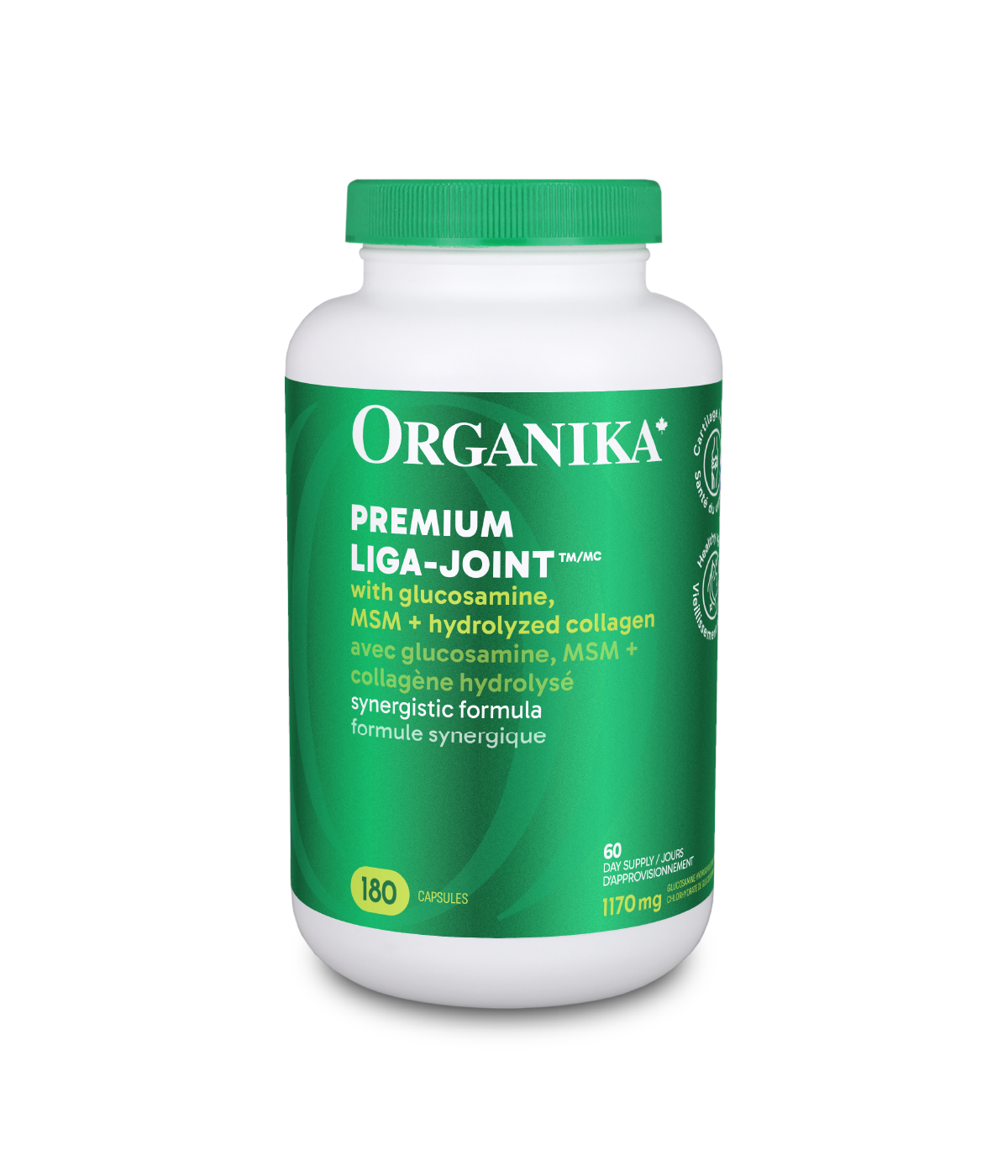
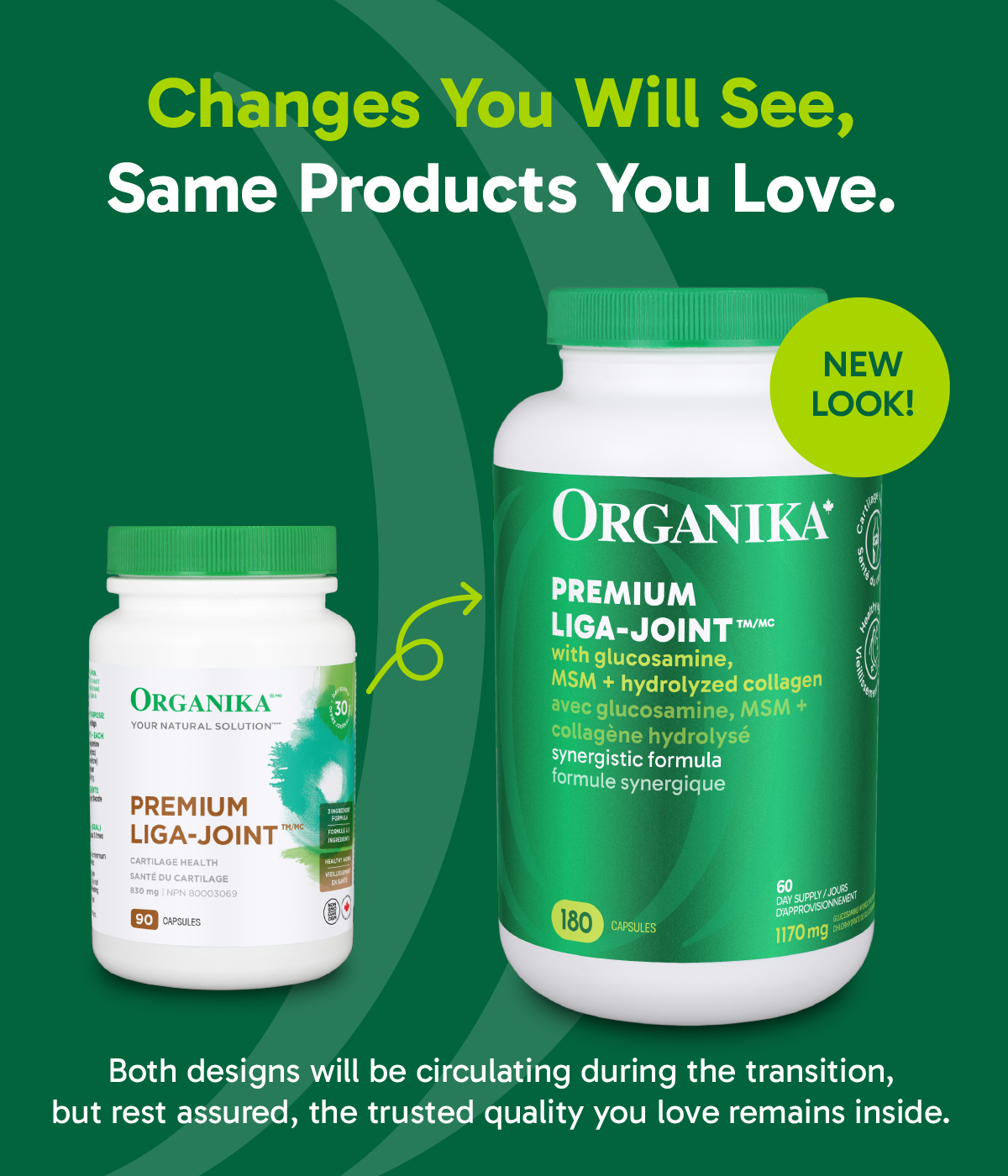
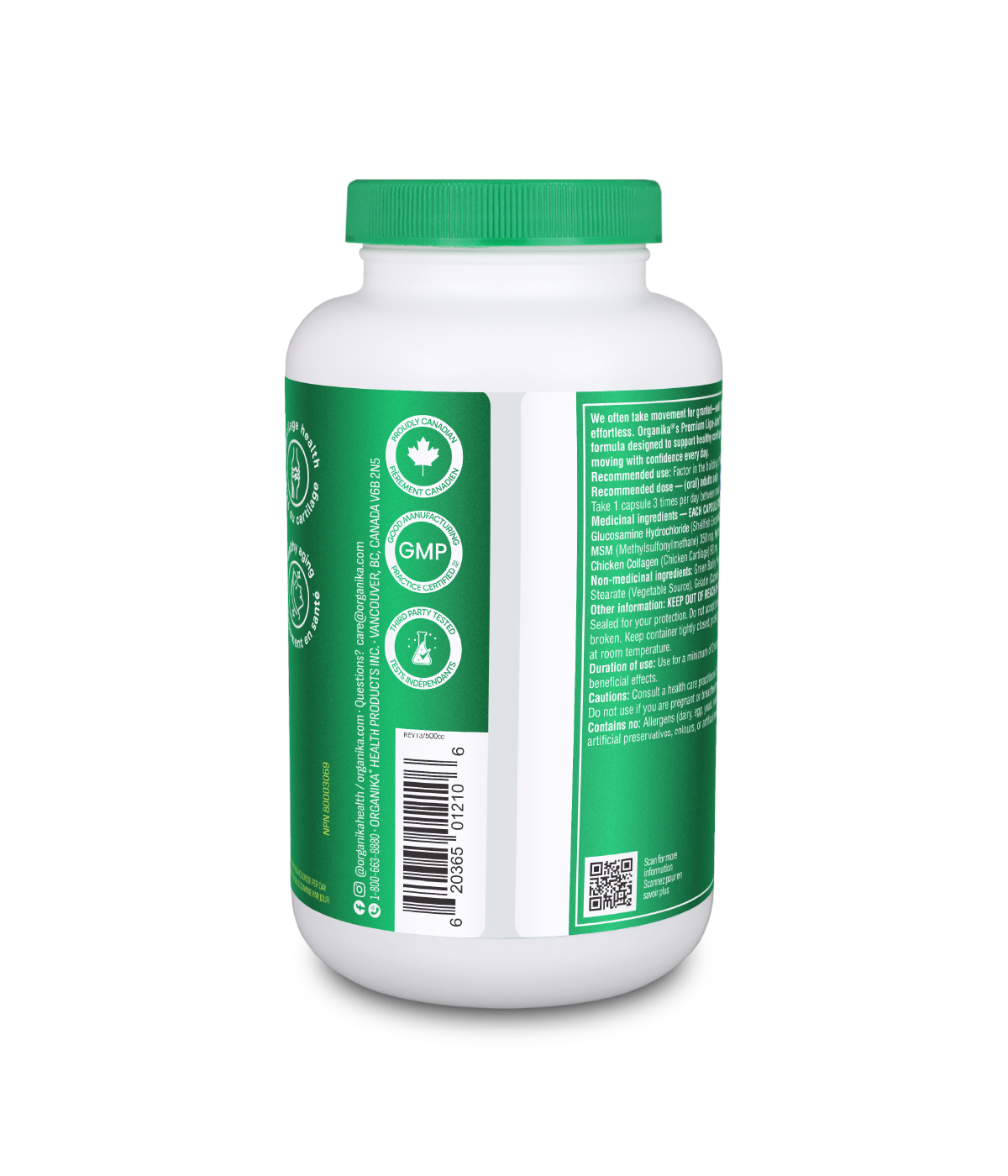
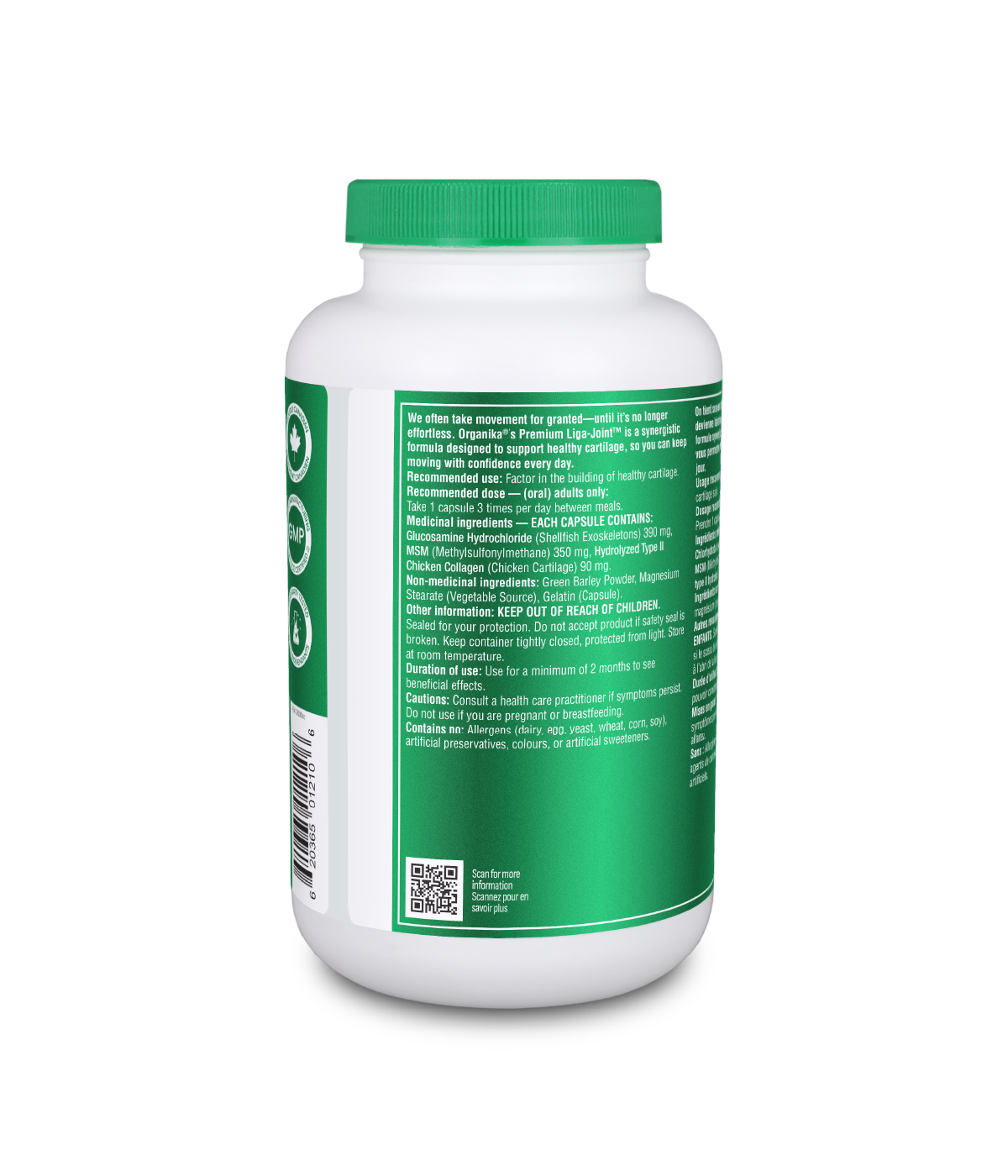
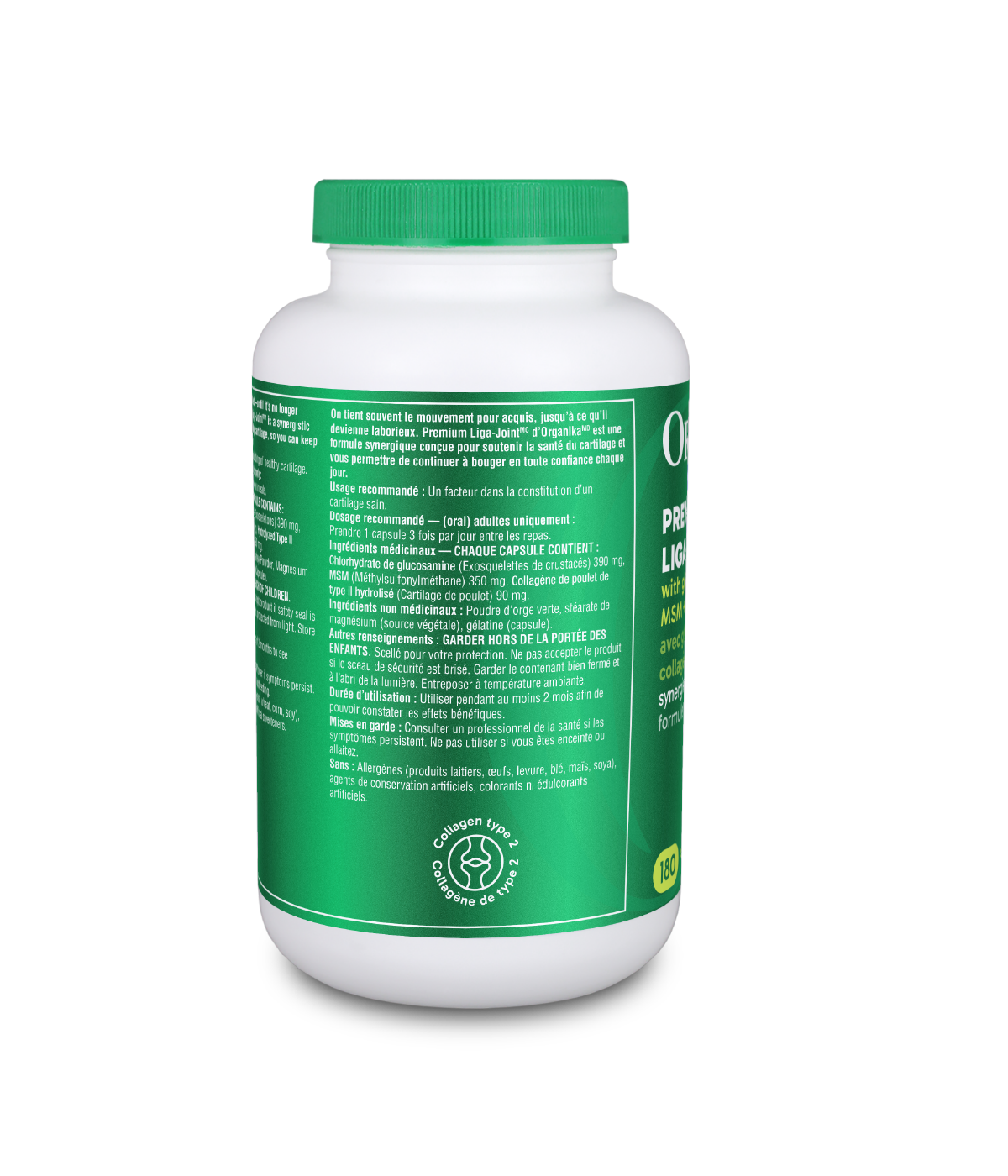




-
Is this right for you?

-


-


-

-

-

-

Liga-Joint Premium
Move with ease and maintain healthy joints
- Reduces joint pain and inflammation associated with osteoarthritis
- Promotes mobility and range of motion
- Supports healthier, more resilient cartilage
- Helps joints stay responsive
Impossible de charger la disponibilité du service de retrait



Notify Me When Available
Enter your email and we'll let you know as soon as this product is back
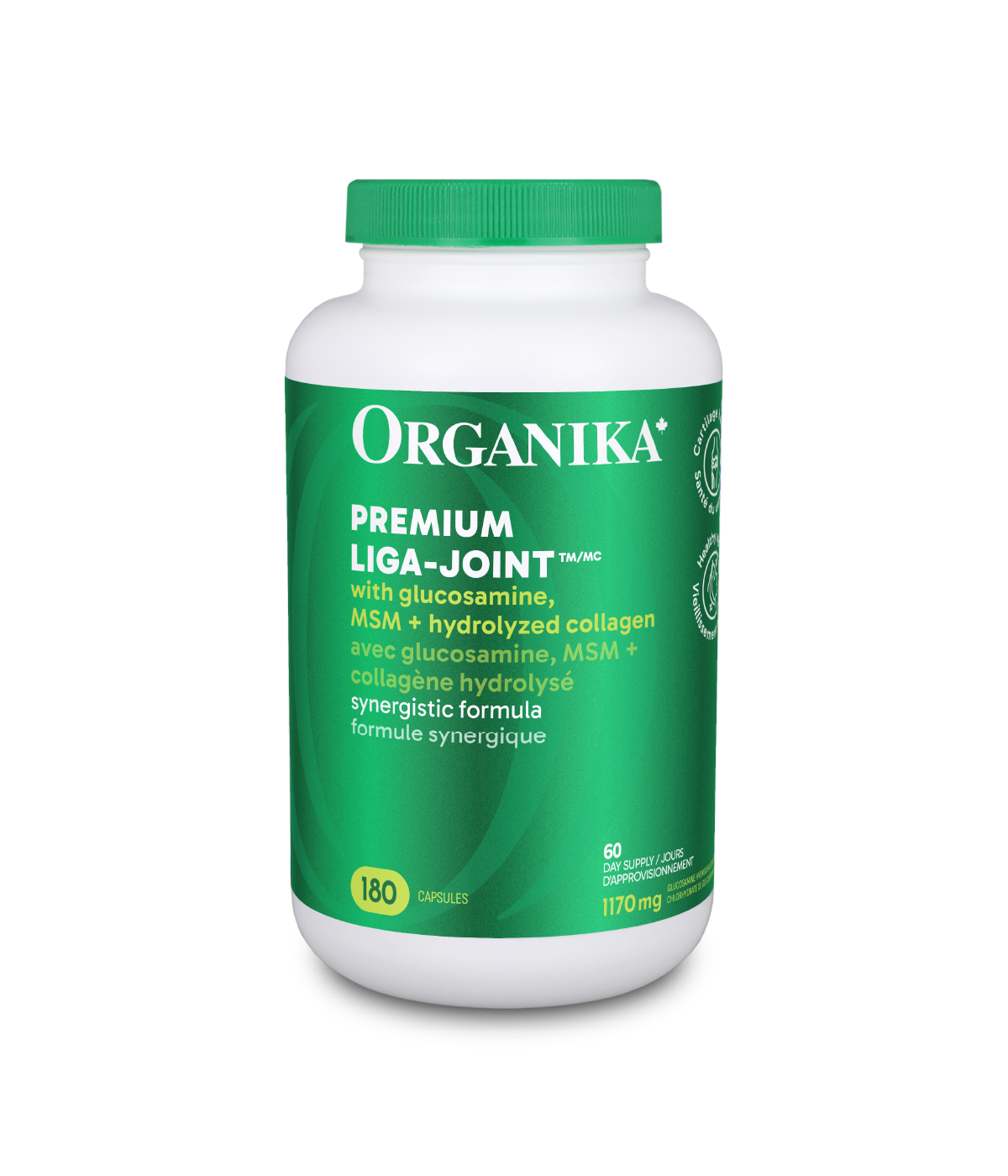
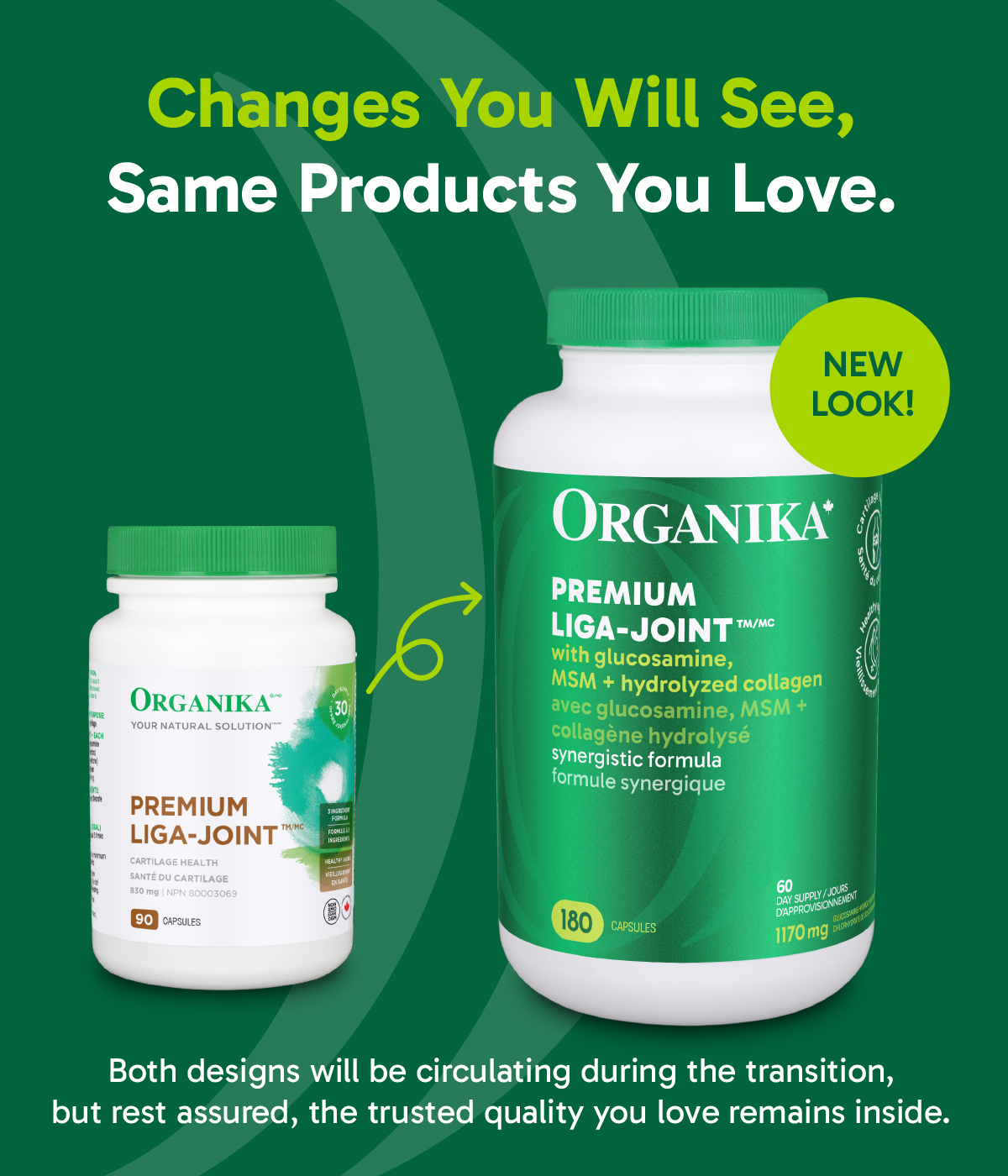
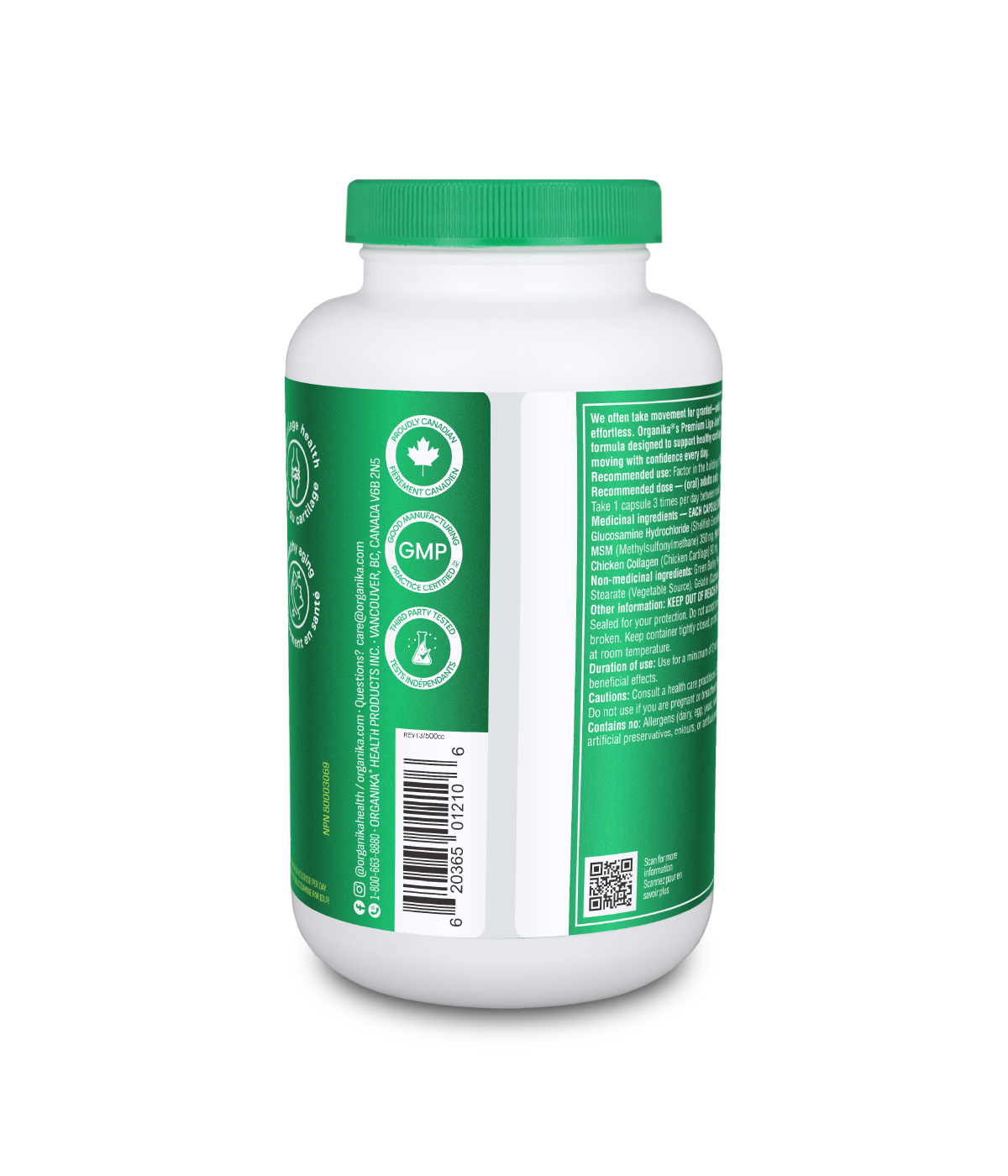
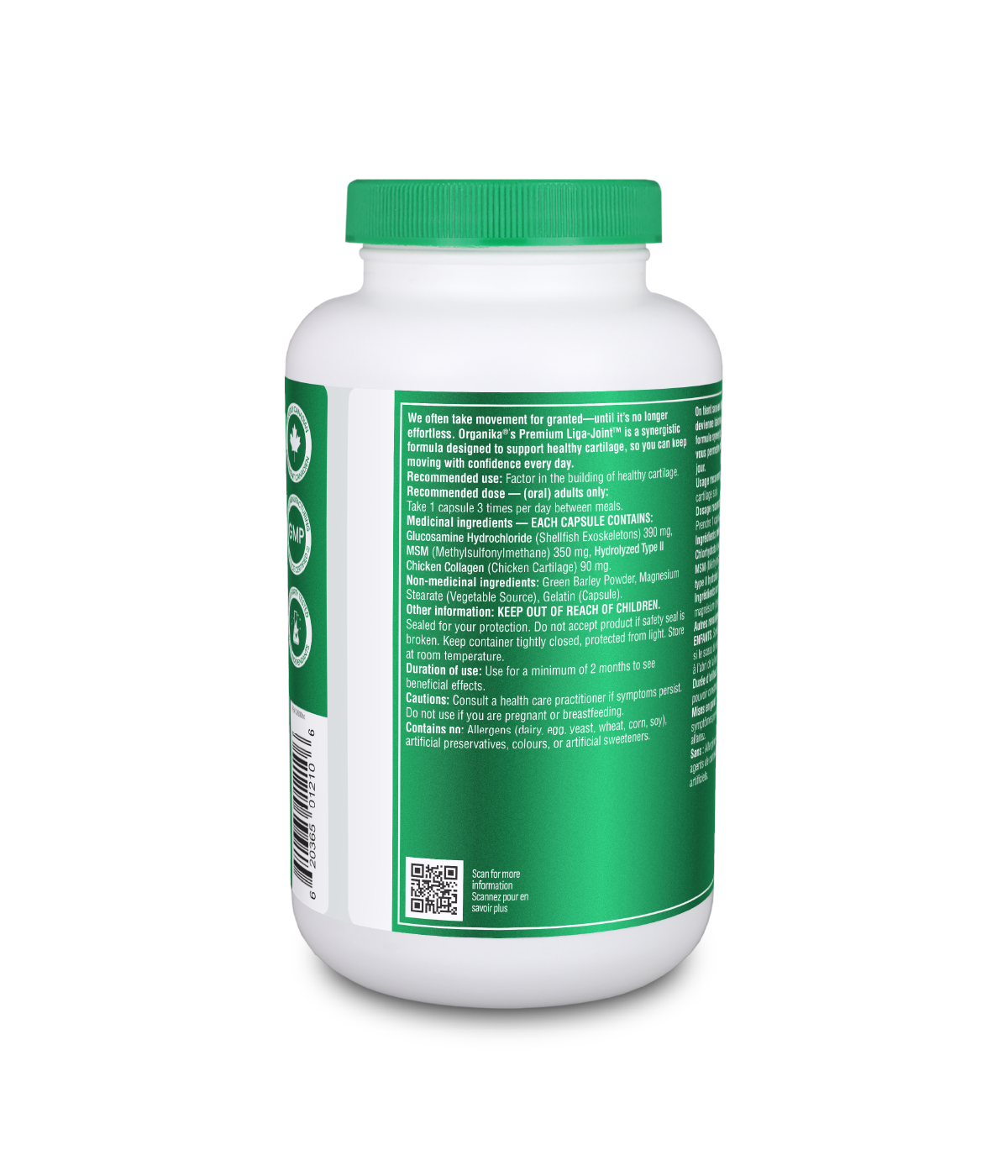
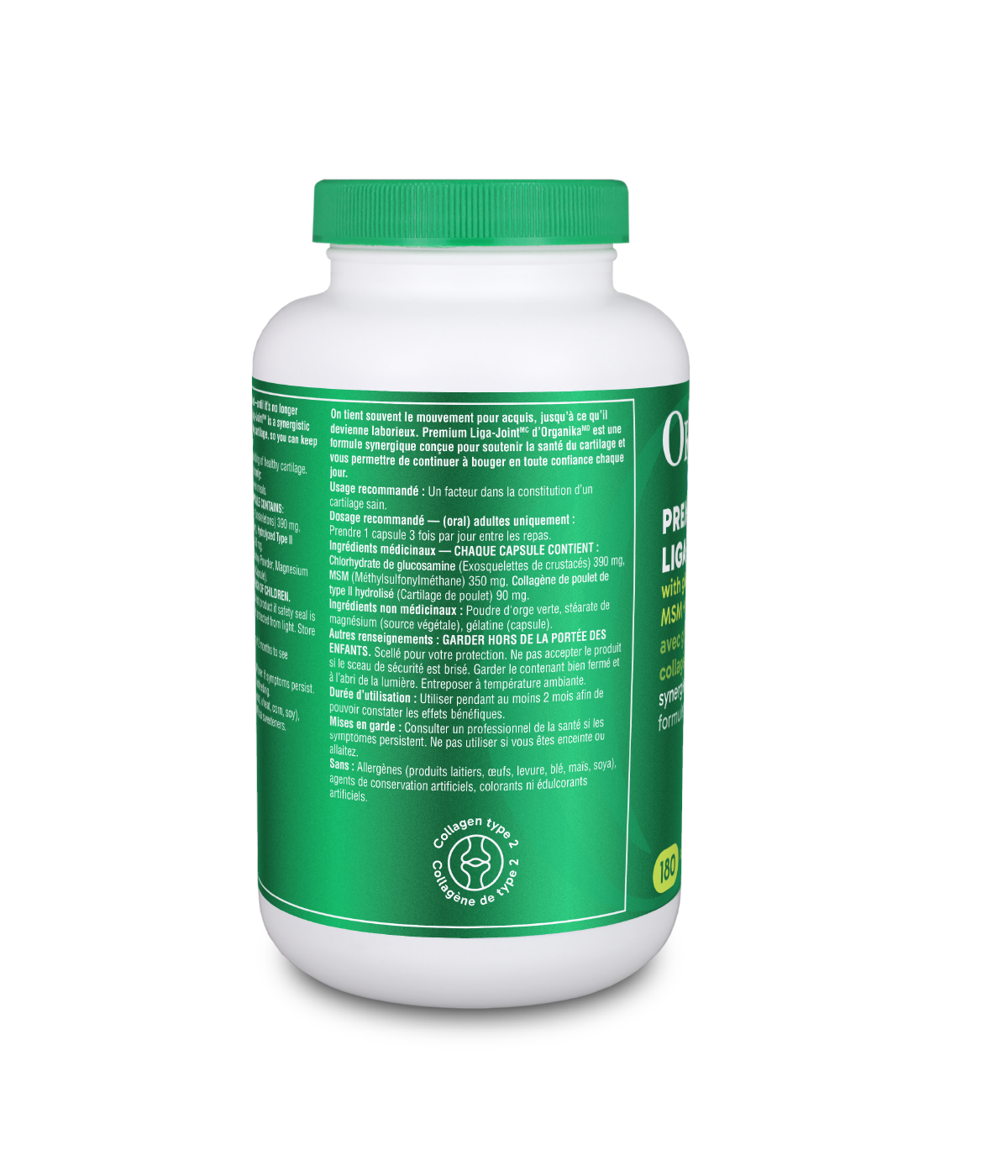





Supplement Facts





Ingredients & Nutrition
MEDICINAL INGREDIENTS - EACH CAPSULE CONTAINS: Glucosamine Hydrochloride (Shellfish exoskeletons) 390 mg, MSM (Methylsulfonylmethane) 350 mg, Hydrolyzed Type II Chicken Collagen (Chicken Cartilage) 90 mg.
NON-MEDICINAL INGREDIENTS: Green Barley Powder, Magnesium Stearate (Non-GMO Vegetable Source), Gelatin (Capsule).
RECOMMENDED DOSE - (ORAL) ADULTS ONLY: Take 1 capsule 3 times per day between meals.
Duration of Use: Use for a minimum of 2 months to see beneficial effects.
Cautions: Consult a health care practitioner if symptoms persist. Do not use if you are pregnant or breastfeeding.
Is This Right for You?
Do you want to reduce joint discomfort and improve your range of motion?
Are you looking for support to rebuild and maintain healthy cartilage?
Do you need a reliable way to keep moving comfortably through daily activities or workouts?
If you answered "yes" to any of the above, this product is right for you.

-
Supports healthier, more resilient cartilage
-
Helps joints stay responsive
Ingredients & Nutrition
Recommend For
Do you want to reduce joint discomfort and improve your range of motion?
Are you looking for support to rebuild and maintain healthy cartilage?
Do you need a reliable way to keep moving comfortably through daily activities or workouts?
If you answered "yes" to any of the above, this product is right for you.
Gluten-Free
Caffeine-Free
Keto Friendly
Non-GMO
No Artificial Sweeteners
No Artificial Colours or Flavours
Liga-Joint Premium delivers targeted support to help reduce joint pain, rebuild cartilage, and keep your joints flexible


The Full Scoop

-
Supports healthier, more resilient cartilage
-
Helps joints stay responsive
Liga-Joint Premium is built for movement that feels good. This synergistic blend of MSM, glucosamine and hydrolyzed collagen helps reduce inflammation, relieve joint pain and rebuild cartilage so your joints stay smooth and dependable. If you're chasing after kids, lifting heavy, getting back into your workout groove, or just want to take the stairs without thinking twice, this formula supports the cushion and flexibility your joints need to keep up. Formulated with range of motion in mind, Liga-Joint Premium helps rebuild cartilage while reducing mechanical stress on bones for better movement.
Ask Away
We’ve got the FAQs covered. But if you’re still stuck, we’re only a message away.
Get in TouchSulfur sounds important. Can I also get it in my diet?
Absolutely. Many excellent whole foods, like the allium family (garlic, onions, leeks etc.), the cruciferous family (broccoli, cauliflower, Brussels sprouts, kale, etc.), nuts, seeds, dairy products and eggs contain sulfur for the body's daily uses.
What are the different types of collagen, and what are they used for?
We have 27 different types of collagen, but there are three types that we use in the most abundance. Type 1 Collagen primarily goes towards the health of our hair, skin and nails, and is found in marine and bovine skins. Type 2 Collagen works best at building connective tissues, ligaments and cartilage, and is high in poultry bones and cartilage. Type 3 Collagen builds muscles and organs and is found in bovine hides.
If collagen is such an abundant protein, why would I need to supplement?
As we age, our endogenous collagen formation naturally decreases. This can be up to 50% by the time we hit age 45. The more active we are, the more of these collagen peptides we need to heal after exercise and sport. Plus lifestyle choices that promote free radical damage like smoking, chronic stress and chemical exposure from our food, water, and personal care products can use up our collagen faster. All these losses can contribute to signs of premature aging, like fine lines and wrinkles, brittle nails, cellulite and dry skin, as well as joint and ligament issues like injuries, weakness and arthritis.
Have we always been deficient in collagen? Why do we need to supplement now?
Collagen used to be quite prevalent in our diet, when we used and ate more of the whole animal. Natural collagen sources like skin, bones, joints and organs were all used regularly in cooking. A long-simmering bone broth or slow-cooked meat on-the-bone stew can provide an abundance of collagen and gelatin. We're also not cooking at home from scratch as much. Supplementation can make up for our lack of traditional ways of cooking.
Is Organika's Liga-Joint Premium suitable for vegetarians?
Unfortunately no. It contains shellfish and chicken cartilage and is packed in a gelatin capsule. Consider Organika's Boswellia Curcumin Complex, Curcumin or Plant-based Collagen Booster for a vegan-friendly way to support joint health.
You'll Likely Also Love...
Enhanced Collagen Protein Bone & Joint
Ease pain, fight inflammation and protect your bones and joints
Curcumin
Relieve aches and pains with turmericís most active compounds
Chicken Bone Broth Protein Powder
All the chicken bone broth benefits, none of the stovetop hassle
Full Body Enhanced Collagen Protein
A collagen blend for the whole body with 10 g of protein
Support Beyond Products
Learn about the best supplements to support your joints and combat joint pain Joint pain can prevent you from doing things you love, an agonizing menace in your body often associated with arthritic pain. There's natural solutions that can provide relief and support. What is joint pain? Joint pain is described as discomfort coming from any of your joints – but the cause may be coming from your cartilage, bones, ligaments, or muscles and tendons. In most cases, joint pain is due to inflammation, or the cartilage around the joint being worn down. Cartilage is the material that rests between bones and prevents them from rubbing together. Over time, the cartilage breaks down (age, certain activities, etc.). This can lead to osteoarthritis and a source of joint pain that can be debilitating at times. The best supplements to take for joint pain The most well-known supplements to support the joints, and help with pain or inflammation appear to be: Collagen Glucosamine Chondroitin MSM Collagen Fish Oil – Omega 3s Turmeric Boswellia All of these are naturally occurring supplements that have been used to treat, support or prevent joint pain. There is growing evidence that these supplements help a body that is either aging or active. Taking these supplements may help with prolonged activity, recovery, performance and simply increasing your quality of life. How does collagen support your joints? Collagen is a protein that is found in many parts of the body that gives you structure, including cartilage, joints, ligaments, and bones. Because collagen declines (the production of it and the amount you have) as you age... your joints can start to feel it. Collagen is necessary for joint health. Providing your body with collagen supplements can offset the effects of wear and tear and help to rebuild that joint health, especially in high-risk groups.¹¹ Collagen also provides support for both tissue and cartilage formation, which is important in repairing and restoring, especially after movement. It also decreases stiffness in the joints, which helps with mobility; this is important for exercise and recovery and everyday life. Stronger joint stability is also contributed to strong bones, as collagen helps the bone matrix as well. Reducing inflammation, joint pain and muscle pain There are three other supplements that are massively known to help with joint pain, and taken by athletes, those with osteoarthritis, and anyone experience joint discomfort: Glucosamine, Chondroitin, and MSM. Glucosamine Research indicates that glucosamine may reduce inflammation¹, especially when used with chondroitin.² Glucosamine supplements protect your joints from damage because it is involved in the healthy development of cartilage. ³ ⁴ Chondroitin Chondroitin sulfate is a popular supplement that people often use to help manage joint pain, specifically with osteoarthritis. It has been studied and found to help symptoms associated with joint degeneration when combined with glucosamine. ⁵ ⁶ Methylsulfonylmethane [MSM] MSM is also used to decrease joint and muscle pain and overall improve the quality of life. It has been studied to benefit those with joint degeneration pain in ages 50+⁷ as well as found to significantly reduce inflammation in your body. Furthermore, it has been found to inhibit breakdown of cartilage, so useful in prevention before getting to that stage of life.⁸ MSM is well studied to reduce arthritis symptoms⁹ as well as stiffness and pain related to prolonged exercise,¹⁰ proven to be a helpful supplement for pain. Combining the best supplements into one NEW! Enhanced Collagen™ Bone & Joint is the answer for all things joint health, joint pain, for the active and anyone with osteoarthritis. We have taken Canada's #1 Collagen Powder* and combined it with a synergistic blend of ingredients that works to prevent bone loss, joint degeneration, inflammation, and reduce joint pain. Enhanced Collagen Bone & Joint provides: 9g Collagen 1500mg Glucosamine 800mg Chondroitin 1500mg MSM As well as Vitamin D3 and K2 (for added bone support) This is the ultimate joint health support and great for: prolonged exercise recovery osteoarthritis and joint pain joint and cartilage protection Are there others that I should consider adding? There are a few other supplements that also work with joint health in specific ways. Fish Oil/Omega-3s Omega-3 fatty acids work specifically to combat inflammation in the body, including your joints. Your body uses it as blockers to remove joint stiffness or tender joints causing pain. Try: Krill Oil Turmeric This is the aromatic and golden spice found in curry. It is a compound in the curcumin spice which contains proteins that block inflammation in the body and help with pain. Over time, it can ease joint pain and help with mobility. Try: Turmeric+ Powder with Curcumin, Turmeric Mylk Latte, Chicken Bone Broth Powder with turmeric Boswellia Also referred to as “Indian frankincense”, this is an extract from a naturally occurring plant and been a part of both Asian and African traditional medicine for centuries. The active ingredient helps with pain in joints. It may also slow down cartilage loss. Try: Boswellia Curcumin This article has been fact checked. REFERENCES: 1 https://pubmed.ncbi.nlm.nih.gov/28586015/ Yamagishi Y, Someya A, Imai K, Nagao J, Nagaoka I. Evaluation of the anti-inflammatory actions of various functional food materials including glucosamine on synovial cells. Mol Med Rep. 2017 Aug;16(2):1353-1359. 2 https://pubmed.ncbi.nlm.nih.gov/25719429/ Navarro SL, White E, Kantor ED, Zhang Y, Rho J, Song X, Milne GL, Lampe PD, Lampe JW. Randomized trial of glucosamine and chondroitin supplementation on inflammation and oxidative stress biomarkers and plasma proteomics profiles in healthy humans. PLoS One. 2015 Feb 26;10(2):e0117534. 3 https://pubmed.ncbi.nlm.nih.gov/30940583/ Nagaoka I, Tsuruta A, Yoshimura M. Chondroprotective action of glucosamine, a chitosan monomer, on the joint health of athletes. Int J Biol Macromol. 2019 Jul 1;132:795-800. 4 https://pubmed.ncbi.nlm.nih.gov/27422331/ Correa D, Lietman SA. Articular cartilage repair: Current needs, methods and research directions. Semin Cell Dev Biol. 2017 Feb;62:67-77. 5 https://www.ncbi.nlm.nih.gov/pmc/articles/PMC5241539/ Vasiliadis HS, Tsikopoulos K. Glucosamine and chondroitin for the treatment of osteoarthritis. World J Orthop. 2017;8(1):1-11. Published 2017 Jan 18. doi:10.5312/wjo.v8.i1.1 6 https://pubmed.ncbi.nlm.nih.gov/25589511/ Hochberg MC, Martel-Pelletier J, Monfort J, Möller I, Castillo JR, Arden N, Berenbaum F, Blanco FJ, Conaghan PG, Doménech G, Henrotin Y, Pap T, Richette P, Sawitzke A, du Souich P, Pelletier JP; MOVES Investigation Group. Combined chondroitin sulfate and glucosamine for painful knee osteoarthritis: a multicentre, randomised, double-blind, non-inferiority trial versus celecoxib. Ann Rheum Dis. 2016 Jan;75(1):37-44. 7 https://www.ncbi.nlm.nih.gov/pmc/articles/PMC4502733/ Xu G, Zhou T, Gu Y, et al. Evaluation of the Effect of Mega MSM on Improving Joint Function in Populations Experiencing Joint Degeneration. Int J Biomed Sci. 2015;11(2):54-60. 8 https://pubmed.ncbi.nlm.nih.gov/23011466/ Ezaki J, Hashimoto M, Hosokawa Y, Ishimi Y. Assessment of safety and efficacy of methylsulfonylmethane on bone and knee joints in osteoarthritis animal model. J Bone Miner Metab. 2013 Jan;31(1):16-25. 9 https://pubmed.ncbi.nlm.nih.gov/21708034/ Debbi EM, Agar G, Fichman G, Ziv YB, Kardosh R, Halperin N, Elbaz A, Beer Y, Debi R. Efficacy of methylsulfonylmethane supplementation on osteoarthritis of the knee: a randomized controlled study. BMC Complement Altern Med. 2011 Jun 27;11:50. 10 https://faseb.onlinelibrary.wiley.com/doi/abs/10.1096/fasebj.27.1_supplement.1076.7 A Randomized Double Blind Placebo Controlled Evaluation of MSM for Exercise Induced Discomfort/Pain. - Kalman - 2013 - The FASEB Journal - Wiley Online Library 11 1 24-Week study on the use of collagen hydrolysate as a dietary supplement in athletes with activity-related joint pain - PubMed (nih.gov) Clark KL, Sebastianelli W, Flechsenhar KR, Aukermann DF, Meza F, Millard RL, Deitch JR, Sherbondy PS, Albert A. 24-Week study on the use of collagen hydrolysate as a dietary supplement in athletes with activity-related joint pain. Curr Med Res Opin. 2008 May;24(5):1485-96.
read moreWhether you’re training for a marathon or squeezing in a morning jog, staying hydrated is one of the most important—yet often overlooked—components of performance. Water alone isn’t enough when you’re sweating buckets. That’s where the right strategy, tools, and supplements come in. If you’re wondering how to fuel your workouts and recovery more effectively, this guide is your go-to resource for everything hydration. Why Hydration Matters for Active People When you sweat, your body loses more than water—it loses vital minerals like sodium, potassium, magnesium, and chloride. These are known as electrolytes, and they help: Regulate nerve and muscle function Maintain fluid balance Prevent cramps and fatigue Support energy production Even a 2% drop in hydration can lead to a noticeable decrease in endurance and focus. Hydration Essentials: What Runners & Athletes Need 1. Water + Electrolytes = Hydration Power Combo Hydration for runners goes beyond guzzling plain water. Electrolytes for runners help replenish what’s lost during long runs, intense gym sessions, or outdoor adventures. Whether it’s hydration tablets, hydration powders, or sports drinks, the goal is to replace lost minerals and maintain performance. The best hydration powders are clean, low in sugar, and packed with a balanced blend of electrolytes—like Organika’s Electrolytes Extra Strength, which supports rehydration and recovery without added junk. 2. Tools of the Trade: Hydration Packs and Gear Carrying water during a run or hike can be a challenge—unless you have the right gear. That’s where hydration packs and hydration bags for running come in. These wearable water systems allow for hands-free drinking, essential for longer distances and trail runs. Running hydration packs are lightweight, snug, and often include pouches for hydration salt tablets, gels, and keys. Whether you’re hitting pavement or trail, they’re a game-changer for staying hydrated without breaking your stride. How Much Should You Drink? Hydration isn’t one-size-fits-all. Factors like intensity, duration, weather, and individual sweat rate all come into play. Use this as a starting point: Before a run: 500–750 mL of water or an electrolyte drink 1–2 hours before During: Sip 100–200 mL every 15–20 minutes (especially on runs over 45 minutes) After: Rehydrate with water and electrolytes based on your sweat loss Signs You Need More Electrolytes Watch for signs of imbalance: Muscle cramps Dizziness or light-headedness Headaches Fatigue despite rest Nausea after exercise Quick Hydration Tips for Active Lifestyles Pre-mix hydration powder before your workout Use a hydration pack for runs over 45 minutes Keep hydration tablets in your running belt Pair electrolytes with snacks like bananas or energy chews Rehydrate immediately post-workout Make It Easy with Organika Electrolytes Looking for the best hydration powder to support your active lifestyle? Try Organika Electrolytes Extra Strength. It contains: Clean, balanced electrolytes No artificial sweeteners or fillers Great taste (available in Fruit Punch, Lemon Lime, and Unflavoured) Easy mixability What the Research Says Studies on hydration for runners reveal that many athletes struggle with proper fluid management. Runners often underestimate fluid loss, replacing only 30% of sweat loss (Passe et al., 2007). Research also shows that slower marathon runners plan to drink more frequently than faster ones, but even then, dehydration-related performance drops are common (Namineni et al., 2021). Most runners are aware of exercise-associated hyponatremia (EAH), but few know the symptoms or how to prevent it. According to Cheuvront & Kenefick (2022), runners who train for more than 60 minutes need higher daily fluid intake to maintain performance and safety. Even with access to sports drinks, many runners still face dehydration-related performance issues (O’Neal et al., 2011). These findings highlight the need for personalized, well-planned hydration routines—especially when performance matters. References Passe, D.H., Horn, M., Murray, B., et al. (2007). Voluntary dehydration in runners: Lack of awareness and inadequate rehydration during exercise. Namineni, S., et al. (2021). Hydration strategies among marathon runners and risk of hyponatremia. Cheuvront, S.N., & Kenefick, R.W. (2022). Hydration and endurance performance: Current knowledge and research gaps. O'Neal, E.K., et al. (2011). Effect of hydration status on thermoregulation and performance in distance runners.
read moreHow to exercise using joint protection techniques Suffering from joint pain can leave you questioning your ability to exercise and stay physically fit. That’s why making sure to exercise with joint protection techniques in mind is so important. Your joints need strong muscles to help support them. Moving your body increases the flexibility of your joints and reduces the stiffness. If you suffer from joint pain, moving the right way for your body can help to improve your performance and overall health. 1. Choose low impact activities Choosing the right types of aerobic exercise, strength training and range of motion movements can go a long way when trying to accommodate joint pain. Low impact exercises are activities that are easier on the body, reduce the risk of injury and provide less stress to your joints. Swimming, cycling, yoga, and walking are some examples of low impact movements that can be more accommodating to joint pain and arthritis. 2. Cross train Mixing up your routine with a few different forms of exercise is great for your body. Cross training helps your body to train different muscle groups through different movements, increasing your strength and performance overall. Cross training is also a great way to stay engaged in being active, preventing you from become bored. 3. Take rest days Giving your joints and muscles a rest can help them to repair and strengthen. Overworking your body increases the risk of injury. Schedule rest days in your weekly routine to give your body time to recuperate. 4. Warm up Doing a gentle warm up session such as going for a walk can help to warm your muscles and prepare them for exercise. Warm muscles are more flexible which helps to reduce the measure of strain they go through during a workout. 5. Don’t overdo it If you’re feeling pain, or find you have long periods of pain after a workout, you’re likely overdoing it. Some mild pain may be normal if you’re not used to working out, but the pain shouldn’t be debilitating. Keep your level of exertion relative to your level of fitness. 6. Drink lots of water Hydration is important for overall health, and that includes your joints. Make sure you drink plenty of water when exercising. The more you sweat the more you need to replenish your body with fluids. 7. Wear the right attire Wearing the right kind of fitness attire for the sport you’re practicing, encourages proper range of motion for healthy joint movement. Don’t restrict your movements from clothing too tight or stiff to move with your body. 8. Cool down Take a period of time to slow your exertion near the end of your routine to allow your body to cool down. Always follow your exercises up with light stretching to help reduce feelings of stiffness the next morning. Most importantly, always remember to listen to your body. If you’re in a lot of pain, or are going through an injury, certain exercises might be more harmful than healthy. Always talk to your doctor before starting a new exercise routine, and consider consulting a physical therapist if you’re dealing with severe joint pain. What kind of exercise do you do?
read more





